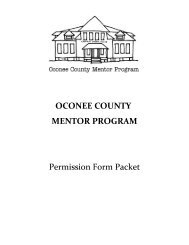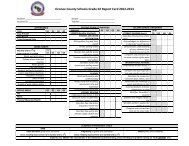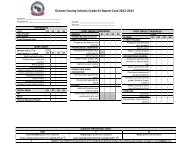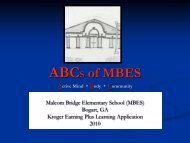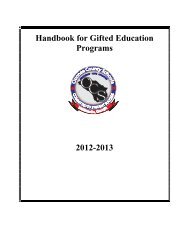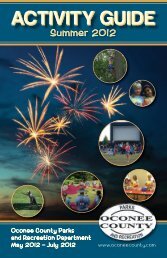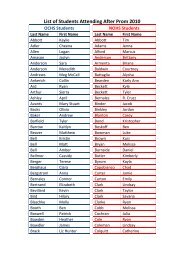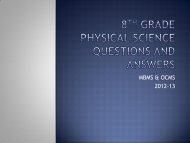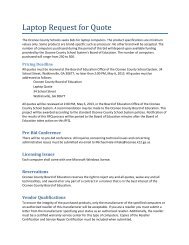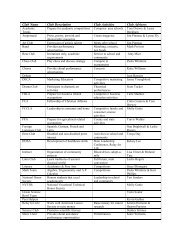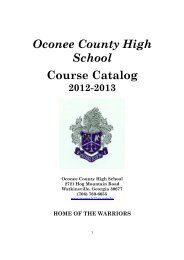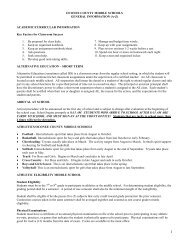North Oconee High - Oconee County Schools
North Oconee High - Oconee County Schools
North Oconee High - Oconee County Schools
You also want an ePaper? Increase the reach of your titles
YUMPU automatically turns print PDFs into web optimized ePapers that Google loves.
Accreditation Report<br />
<strong>North</strong> <strong>Oconee</strong> <strong>High</strong> School<br />
Indicator Statement or Question Response Evidence Rating<br />
3.12 The school provides and<br />
coordinates learning support<br />
services to meet the unique<br />
learning needs of students.<br />
•Survey results<br />
Level 2<br />
School personnel use data to identify<br />
unique learning needs of special<br />
populations of students based on<br />
proficiency and/or other learning needs<br />
(such as second languages). School<br />
personnel are familiar with research<br />
related to unique characteristics of<br />
learning (such as learning styles,<br />
multiple intelligences, personality type<br />
indicators) and provide or coordinate<br />
related learning support services to<br />
students within these special<br />
populations.<br />
•List of learning support<br />
services and student<br />
population served by such<br />
services<br />
•Training and professional<br />
learning related to<br />
research on unique<br />
characteristics of learning<br />
•Data used to identify<br />
unique learning needs of<br />
students<br />
•See e-board<br />
Reflect upon your responses to each of the indicators and performance levels by considering and responding to the following<br />
questions when drafting your narrative response. Use language from the performance level descriptions to guide your writing.<br />
Cite sources of evidence External Review team members may be interested in reviewing.<br />
SACS STANDARD 3 NARRATIVE<br />
AREAS OF STRENGTH: RANK 3<br />
The committee found strengths in the areas of professional learning (3.11), planning, curriculum (3.1), monitoring and supporting the<br />
improvement of instructional practices (3.4) and utilizing and reporting assessments (3.10). Additional strengths were also noted in engaging<br />
both families and students in meaningful ways that encourage the development of relationships (3.8, 3.9). Staff members participate in a<br />
continuous program of professional learning at the school level which has been primarily crafted based on an assessment of the needs of the<br />
school (A), builds capacity among all professional and support staff (B), and is systematically evaluated for effectiveness (C). The curriculum<br />
and course/classes provide equivalent learning expectations, prepare students for success at the next level (D), and often include<br />
individualized learning activities for students (E). Teachers engage students in learning through requiring student collaboration, self<br />
reflection, and the development of critical thinking skills. (F) Teachers also personalize instructional strategies and interventions (G) that<br />
require students to apply knowledge and skills, integrate content and skills with other disciplines (H), and use technologies as instructional<br />
resources and learning tools (I). Teachers use common grading and reporting policies (J), processes (K) and procedures (L) based on<br />
clearly defined criteria that represent each student's attainment of content knowledge and skills (M) and are regularly evaluated by school<br />
personnel (N). School leaders formally and consistently monitor instructional practices through supervision and evaluation procedures to<br />
ensure that they 1) are aligned with the school's values and beliefs about teaching and learning (O) 2) are teaching the approved curriculum<br />
(P), 3) are directly engaged with all students in the oversight of their learning (Q), and 4) use content-specific standards of professional<br />
practice (R). Lastly, the committee found consistency in engaging families and students in meaningful programs (S) which allow for the<br />
building of strong relationships over time (T) and that regular information is provided to families regarding their children's learning process<br />
(U).<br />
ACTIONS TO SUSTAIN AREAS OF STRENGTH:<br />
In order to sustain growth in teaching and assessing for learning the committee recommends the continued utilization of a menu of<br />
professional learning opportunities. Additionally, the committee encourages continued use of systematic procedures in the areas of<br />
curriculum, instruction, assessment, grading, and reporting which hold faculty accountable. Lastly, the committee recommends the<br />
continuation of providing various opportunities for meaningful engagement of NOHS families and the continued development of the<br />
SY 2012-2013 Page 23<br />
© 2013 AdvancED www.advanc-ed.org



